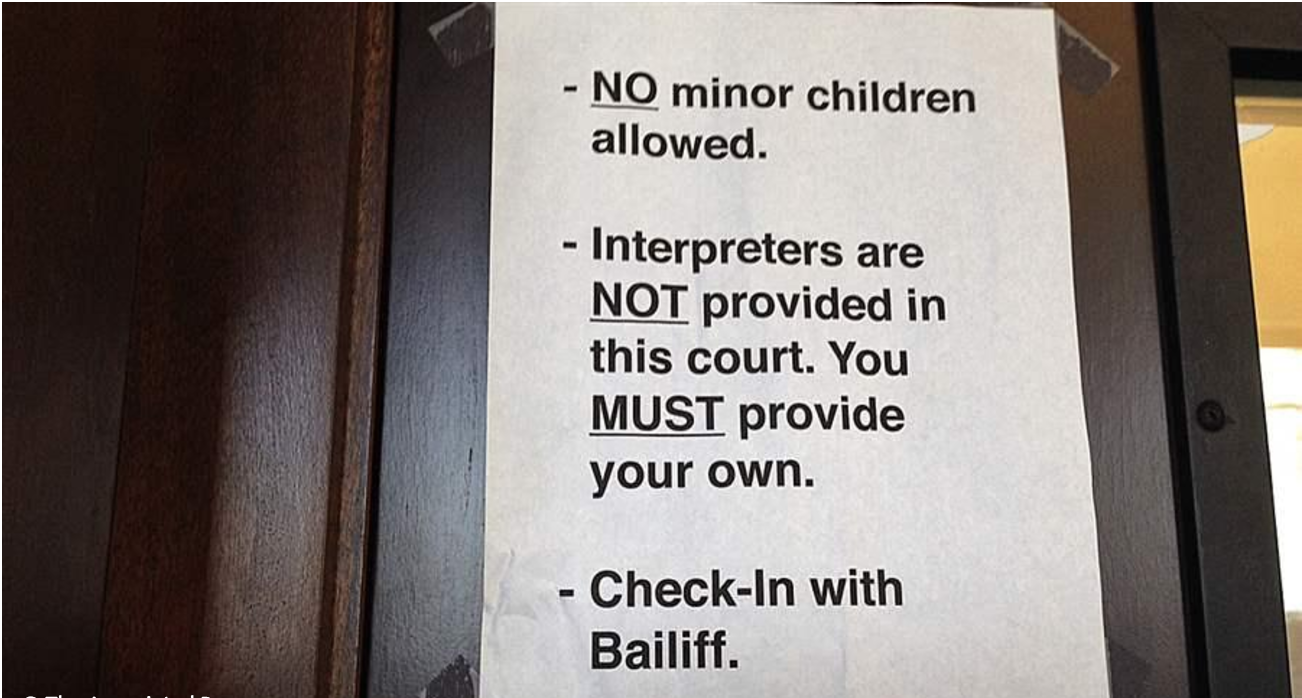Blog
Read Our Most Recent Blog Posts
5 Critical Issues in Court Interpreting
 Through various legislative acts and executive orders, court interpreting has received recognition as a vital part of the judicial system. Yet, the demand for court interpreters has far exceeded their availability. Meanwhile, the courts, language services companies, and the court interpreters themselves are currently facing several critical issues.
Through various legislative acts and executive orders, court interpreting has received recognition as a vital part of the judicial system. Yet, the demand for court interpreters has far exceeded their availability. Meanwhile, the courts, language services companies, and the court interpreters themselves are currently facing several critical issues.
Subpoenaing the Trump-Putin Interpreter: Pros and Cons
 Congress Democrats want State Department interpreter Marina Gross to answer questions about the July 2018 meeting between Trump and Putin. The idea was first suggested almost immediately after the summit was over, when it became clear that there might be no other way to discover what was said in the meeting.
Congress Democrats want State Department interpreter Marina Gross to answer questions about the July 2018 meeting between Trump and Putin. The idea was first suggested almost immediately after the summit was over, when it became clear that there might be no other way to discover what was said in the meeting.
The question is, would this be a positive step, not only for Congress, but for the government, the interpreters, and the American public?
The Role of Language Learning at Both Ends of Life
 When is the best time in life to learn a foreign language? People of all ages can benefit from learning a new language, of course. But recent studies have revealed two key life phases when language learning has a tremendous impact.
When is the best time in life to learn a foreign language? People of all ages can benefit from learning a new language, of course. But recent studies have revealed two key life phases when language learning has a tremendous impact.
Whether you’re young, old, or in between, you can learn a language you’ve never spoken before. If you’re young, you can become fluent more easily. Even if you’re quite old, you might very well put off age-related damage to your brain.
New Doors Are Opening Around the World for the Deaf
 The language barriers that deaf people have always faced are beginning to come down. Around the world, businesses and organizations are beginning to open their doors to the hearing impaired like never before.
The language barriers that deaf people have always faced are beginning to come down. Around the world, businesses and organizations are beginning to open their doors to the hearing impaired like never before.
Read about a sign language café in Pakistan, an Uber app for deaf drivers, a Starbucks signing store and an Austrian language class for deaf refugees.
When Justice Stands Still: Here’s Why Court Interpreters Are So Important
 When judges, lawyers, and defendants can’t communicate with each other, the judiciary system quickly grinds to a dead halt. Unfortunately, it happens all too often. That’s because many courts lack the court interpreters that they need to keep the wheels of justice turning. In a country with both non-English speakers and limited English speakers, court interpreters play a critical role.
When judges, lawyers, and defendants can’t communicate with each other, the judiciary system quickly grinds to a dead halt. Unfortunately, it happens all too often. That’s because many courts lack the court interpreters that they need to keep the wheels of justice turning. In a country with both non-English speakers and limited English speakers, court interpreters play a critical role.
With efficient interpreter scheduling, the court runs smoothly and defendants get fair treatment. Everyone wins.
How Interpreters Can Help with Multilingual Voting
 As the U.S. moves steadily towards the next election, interpreters are helping to make voting easier for people who speak languages other than English. Although the Voting Rights Act was passed decades ago, in 1965, states have been slow to put systems in place for fulfilling its goal of giving everyone the ability to vote. Recently, that has begun to change. Interpreters are being called on to help with a variety of tasks related to multilingual voting.
As the U.S. moves steadily towards the next election, interpreters are helping to make voting easier for people who speak languages other than English. Although the Voting Rights Act was passed decades ago, in 1965, states have been slow to put systems in place for fulfilling its goal of giving everyone the ability to vote. Recently, that has begun to change. Interpreters are being called on to help with a variety of tasks related to multilingual voting.
Can Alexa Really Take Over Interpreting for the Deaf?
 Yep. It happened. Somebody made an app for deaf people who use American Sign Language (ASL) to interact with Amazon Alexa. While all the bugs haven’t been worked out yet, the app promises a world where the deaf will no longer be excluded from technologies based on non-text input. Since most people can enjoy the benefits of voice-assisted technology, it’s a step in the right direction.
Yep. It happened. Somebody made an app for deaf people who use American Sign Language (ASL) to interact with Amazon Alexa. While all the bugs haven’t been worked out yet, the app promises a world where the deaf will no longer be excluded from technologies based on non-text input. Since most people can enjoy the benefits of voice-assisted technology, it’s a step in the right direction.
The question for people who do real-time interpretation for a living is: How soon will computers take over the industry? The answer is that such a future hasn’t arrived yet, and it isn’t likely to come tomorrow. Still, wise language service providers need to be ready to explain the advantages of human interpretation in situations where every word counts.
Finding the Right Approach to Interpreter Scheduling Challenges
 How is your interpreter scheduling system working for you? If you find that your organization is plagued by missed appointments, communication overload, or general scheduling confusion, you’re not alone. Scheduling is a tough task for any organization or busy individual. The good news is that with the right approach, you can accomplish all your interpreter scheduling tasks efficiently and effectively.
How is your interpreter scheduling system working for you? If you find that your organization is plagued by missed appointments, communication overload, or general scheduling confusion, you’re not alone. Scheduling is a tough task for any organization or busy individual. The good news is that with the right approach, you can accomplish all your interpreter scheduling tasks efficiently and effectively.
Arizona Will Soon Require Court Interpreters To Know Law
 Foreign language interpreters are now being subject to further their education beyond the boundaries of language interpretation. Arizona will soon require court interpreters to know the law, and this makes perfect sense. Having a clear and concise knowledge of the industry in which you are interpreting for is paramount for a successful scheduled courtroom interpretation.
Foreign language interpreters are now being subject to further their education beyond the boundaries of language interpretation. Arizona will soon require court interpreters to know the law, and this makes perfect sense. Having a clear and concise knowledge of the industry in which you are interpreting for is paramount for a successful scheduled courtroom interpretation.
How An Online Scheduling Software Can Increase Your Organization’s Efficiency
One of the main reasons why an agency would adopt an interpreter scheduling software would be to increase their efficiency. Efficiency is crucial for saving time, money, increasing employee productivity and increase the quality of service you provide.
Technology Plays A Great Role In Courtroom Interpretation!
 Technology plays a vital role in today’s courtrooms. This is especially relevant in Utica where there are more than 50 languages spoken. Having such a diverse language span, sometimes language service providers are unable to provide a simultaneous interpreter in person. So this means the courts have to turn to technology, which is a good thing, however, the platform they are using is off the mark completely.
Technology plays a vital role in today’s courtrooms. This is especially relevant in Utica where there are more than 50 languages spoken. Having such a diverse language span, sometimes language service providers are unable to provide a simultaneous interpreter in person. So this means the courts have to turn to technology, which is a good thing, however, the platform they are using is off the mark completely.
5 Multilingual Celebrities That Might Surprise You!
 Being in the language access industry we often only think of the importance of providing limited English speakers, deaf and hard of hearing patients with with access to healthcare, legal and government services through the use of interpreters.
Being in the language access industry we often only think of the importance of providing limited English speakers, deaf and hard of hearing patients with with access to healthcare, legal and government services through the use of interpreters.
Once we take some time to look beyond the day to day necessities of language access it becomes apparent how diverse a society we live in.
The EU Is Going Straight to the Source!

The EU Court of Justice operates a substantial language access process. With over 600 lawyer-linguists staffed internally and managed by Directorate-General, the courts still outsource one-third of its translation and interpretation work to freelance translators and interpreters. So as of December 16th, 2016, the courts issued an invitation to bid for a new framework contract worth about €6 million. However, language service providers (LSPs) need not apply!
What is VRI and What Are Its Main Benefits?
 VRI can reduce costs dramatically. In nearly every scenario, when compared to an interpreter arriving in person, VRI is considerably cheaper. With lower costs and the consumer being given access almost instantly to an interpreter, VRI is expected to grow significantly in the coming years.
VRI can reduce costs dramatically. In nearly every scenario, when compared to an interpreter arriving in person, VRI is considerably cheaper. With lower costs and the consumer being given access almost instantly to an interpreter, VRI is expected to grow significantly in the coming years.
Top Benefits to Implementing an Online Scheduling Software
 Managing an interpreter’s schedule at different locations and times is a daunting task. With your financials, interpreter’s information, client information and a list of upcoming unfilled jobs all being on separate platforms, it makes the whole process very difficult. Interpreter Intelligence was created to solve these issues and provide benefit to language service providers who struggle with the wide range of activities not located on a centralized platform.
Managing an interpreter’s schedule at different locations and times is a daunting task. With your financials, interpreter’s information, client information and a list of upcoming unfilled jobs all being on separate platforms, it makes the whole process very difficult. Interpreter Intelligence was created to solve these issues and provide benefit to language service providers who struggle with the wide range of activities not located on a centralized platform.
Increases in Efficiency for Confirming Appointments via SMS

The ways in which mobile phones can be utilized have changed an astronomical amount in recent years. With massive advances in technology, this means the scope for SMS activity has dramatically increased. Managing interpreter schedules has now become a lot easier, with the ability for an interpreter to directly reply to an SMS offer, this will shorten the length of the confirmation process.
How Advances in Technology Are Actually Driving the Demand for Interpreters Up and Not Down
 With advances in technology, people would think that interpreter and translator jobs would be at jeopardy, but actually, this is not the case. Globalization today is bigger than it has ever been. The huge multinational companies such as Apple and Facebook for examples are making big steps in innovation, which in fact is creating more of a demand for interpreters.
With advances in technology, people would think that interpreter and translator jobs would be at jeopardy, but actually, this is not the case. Globalization today is bigger than it has ever been. The huge multinational companies such as Apple and Facebook for examples are making big steps in innovation, which in fact is creating more of a demand for interpreters.
An Insight to Why States Are Ignoring the Requirements to Provide Interpreters
 One of the main worries about being a court translator is that the smallest mistake in translation could mean injustice at a catastrophic level. With a legal requirement of the state to provide an interpreter, it is crucial that the chosen interpreter has the ability and experience level to make accurate translations in the correct context, however, this is not always the case as in many situations, states choose to ignore these requirements.
One of the main worries about being a court translator is that the smallest mistake in translation could mean injustice at a catastrophic level. With a legal requirement of the state to provide an interpreter, it is crucial that the chosen interpreter has the ability and experience level to make accurate translations in the correct context, however, this is not always the case as in many situations, states choose to ignore these requirements.
Language Access Issues During the 2016 Presidential Election
 Regardless of your political affiliations, as a US citizen and eligible voter you have the right to access language services at the polling station to ensure you can make the best possible informed decision when casting your vote. Federal law requires that access to interpreters be provided either via the phone or in person at the polling station for those voters who require it.
Regardless of your political affiliations, as a US citizen and eligible voter you have the right to access language services at the polling station to ensure you can make the best possible informed decision when casting your vote. Federal law requires that access to interpreters be provided either via the phone or in person at the polling station for those voters who require it.
Lower Costs by 50% by Moving from Excel to an Online Interpreting System
 Many small businesses find great success managing their operations, schedules, and financials with Microsoft Excel. It’s certainly a powerful tool. However, in a highly transactional environment such as Interpreting Services, Excel can show its limitations pretty rapidly. And this is exactly the scenario that Translation.ie, now the largest independent Language Service Provider in Ireland, found themselves in.
Many small businesses find great success managing their operations, schedules, and financials with Microsoft Excel. It’s certainly a powerful tool. However, in a highly transactional environment such as Interpreting Services, Excel can show its limitations pretty rapidly. And this is exactly the scenario that Translation.ie, now the largest independent Language Service Provider in Ireland, found themselves in.
The Power of a Dynamic Interpreter
 The snowstorm that hit the East Coast last week was dramatic. And New York City Mayor Bill de Blasio’s television briefings could be described similarly. It wasn’t the Mayor’s delivery of his updates that were so eye opening, but that of his American Sign Language interpreter partner, Jonathan Lamberton. It’s worth watching just how effective he is.
The snowstorm that hit the East Coast last week was dramatic. And New York City Mayor Bill de Blasio’s television briefings could be described similarly. It wasn’t the Mayor’s delivery of his updates that were so eye opening, but that of his American Sign Language interpreter partner, Jonathan Lamberton. It’s worth watching just how effective he is.
The VA Fiasco – Listen Up Interpreter Scheduling Professionals
 You may or may not be a fan of John Stewart, but his commentary on the Veterans Affairs (VA) Scheduling System challenges is pretty funny. Unfortunately, the problems that the VA is facing are anything but humorous.
You may or may not be a fan of John Stewart, but his commentary on the Veterans Affairs (VA) Scheduling System challenges is pretty funny. Unfortunately, the problems that the VA is facing are anything but humorous.
3 Reasons Why Skype Translator Won’t Soon Replace Video Interpreting
Skype Translator is very exciting for a number of reasons as the promise of real-time audio translation has incredible potential in both consumer and business settings. This technology is literally decades in the making and there are a number of players making significant investments in the technology. NTT Docomo released a “nearly real-time” voice translator in late 2011 and Google (of course) has developed a real-time translation technology with “near-perfect results”. As we all know in the interpreting world, “near-perfect” is exactly the reason why the technology won’t be able to be relied on for quite some time.
